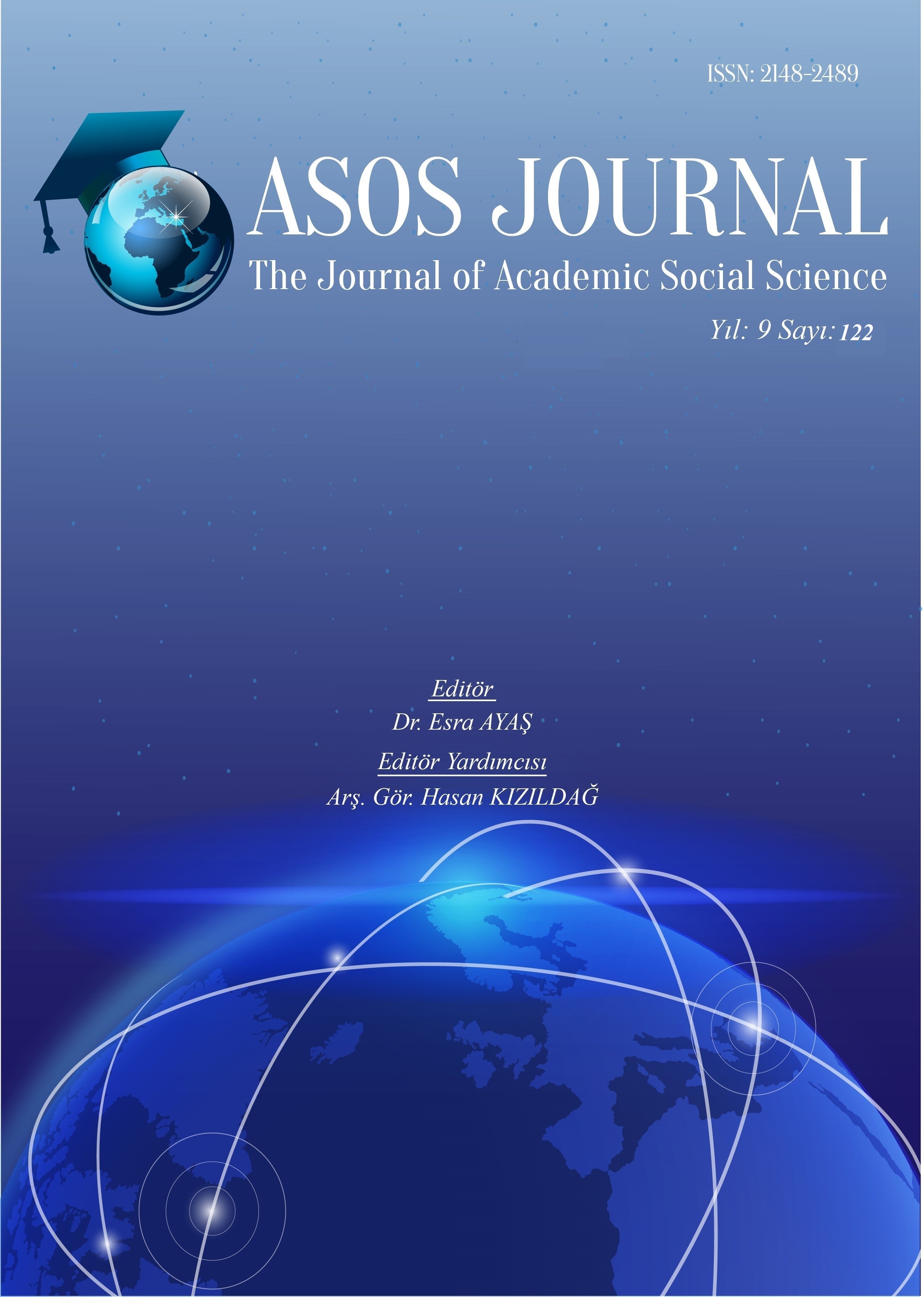ARZ-I FİLİSTİN CEMİYETİ’NİN (RUS İMPARATORLUĞU ORTODOKS FİLİSTİN CEMİYETİ) 19.YÜZYILDA SURİYE ve FİLİSTİN’DE AÇTIĞI OKULLAR
Author :
Abstract
Batılı devletler 18 ve 19. yüzyıllarda Asya ve Avrupa’nın çeşitli yerlerinde ekonomik ve siyasi hâkimiyet için sürekli mücadele etmişlerdir. Bu mücadelede diplomatik, ekonomik, askeri ve ideolojik pek çok araç kullanmışlardır. 19. yüzyılda bu araçlara din ve eğitim de eklenmiştir. Filistin Rusya için hiçbir ekonomik çıkar sağlamamasına rağmen dini, kültürel ve siyasi açıdan Osmanlı-Rus-Avrupa ilişkilerinde oldukça önemli rol oynamıştır. 19.yy’ın ikinci yarsından itibaren bölgedeki nüfuzunu arttırmak isteyen Rusya, Arz-ı Filistin Cemiyeti’ni kurarak Batılı devletlerle güç mücadelesine girmiştir. Makalemiz Rusya’nın bölgeye girişini, Arz-ı Filistin Cemiyeti’nin kuruluş sürecini, eğitim amaçlı girişimlerini, Batılı misyonlarla rekabetinin sebep ve sonuçlarını ve bu bağlamda Osmanlı Devleti’yle ilişkilerini incelemektedir. Araştırmamızda başta Osmanlı arşivleri olmak üzere, yerli ve yabancı literatürden faydalanılmıştır. Elde edilen bilgiler sonucu Rus okullarının faaliyetleri bölgede açılan İngiltere ve Fransa gibi batılı devletlerin okulları ile karşılaştırılarak başarı/başarısızlık nedenleri ve sonuçları ortaya konularak Birinci Dünya Savaşı ve 1917 tarihli Sovyet İhtilali’nin Suriye ve Filistin’deki Rus okullarına etkisi tartışılmıştır.
Keywords
Abstract
Western states struggled continuously for economic and political dominance in various parts of Asia and Europe in the 18th and 19th centuries. In this struggle, they used many diplomatic, economic, military and ideological tools. Religion and education were added to these tools in the 19th century. Although Palestine did not provide any economic benefit for Russia, it played a very important role in the Ottoman-Russian-European relations in terms of religion, culture and politics. Starting from the second half of the 19th century, Russia, which wanted to increase its influence in the region, entered into a power struggle with Western states by establishing the Association of Palestine. Our article examines Russia's entry into the region, the establishment process of the Arz-ı Palestine Society, its educational initiatives, the reasons and results of its rivalry with Western missions, and in this context its relations with the Ottoman Empire. For our research, domestic and foreign literature, especially the Ottoman archives, was used. As a result of the information obtained, the activities of Russian schools were compared with the schools of western states such as England and France opened in the region, and the reasons and results of success / failure were revealed. The effects of the First World War and the 1917 Soviet Revolution on Russian schools in Syria and Palestine are discussed.
Keywords
- Aboona, Hirmis (2008), Assyrians, Kurds and Ottomans, Cambria Press, Amherst. Atay, Falih R. (2014), Zeytin Dağı, Pozitif Yayınları.
- Bliznyakov, R.A.– S.S Schevelev (2015),” ПРОСВЕТИТЕЛЬСКАЯ ДЕЯТЕЛЬНОСТЬ ИМПЕРАТОРСКОГО
- Çetinkaya, Arzu (2018), Rusya’nın Ortadoğu’ya Yönelik Dini Politikalarında Misyoner Kurumları (1840-1917), Hiperlink.
- Fedotov, P.V. (2018), “Образовательный проект Императорского православного палестинского общества на территории Иеруса лимского па триархата в 1882–1914гг.: взаимоотношения представителей России с греческими православнымииерархами”, ( 1882-1914'te Kudüs Bölgesinde İmparatorluk Ortodoks FilistinCemiyeti'nin eğitim projesi: Rus Temsilcileri ve Rum Ortodoks Hiyerarşileri arasındakiilişkiler), https://cyberleninka.ru/article/n/obrazovatelnyy-proekt-imperatorskogo-pravoslavnogo-palestinskogo obschestva-na-territorii-ierusalimskogo-patriarhata-v- 1882-1914-gg/viewer.
- Frary, Lucien J. (2013), “Russian Missions to the Orthodoks East: Antonin Kapustin (1817-1894) and his World”, Russian History: 133–151.
- Grushevoy, A. G. (2019), “Доклад Секретаря» как источник по истории ИмператорскогоПравославного Палестинского общества в 1905–1909года х” (1905-1909 yıllarıarası İmparatorluk Ortodoks Filistin Cemiyeti tarihi hakkında bir kaynak olarakSekreterlik Raporu), https://cyberleninka.ru/article/n/doklad-sekretarya-kak-istochnik- po-istorii-imperatorskogo-pravoslavnogo-palestinskogo-obschestva-v-1905-1909-
- godah/viewer (24.05.2018).
- Grushevoy, A. G. (2015), “ШКОЛЫ И ШКОЛЬНАЯ ДЕЯТЕЛЬНОСТЬИМПЕРАТОРСКОГО ПРАВОСЛАВНОГО ПАЛЕСТИНСКОГО ОБЩЕСТВА(Востоковедение и востоковеды в идеологии и политической системе Российскойимперии)”, ( İmparatorluk Ortodoks Filistin Cemiyeti Okulları ve Faaliyetleri), http://www.spbiiran.nw.ru/wp-content/uploads/2017/02/grushev_A_G_33-2015.
- Hopwood, Derek (1969), The Russian Presence in Syria and Palestine 1843-1914(Church and Politics in The Near East), Clarendon Press-Oxford.
- Kane, Eileen M. (2005), “ Pilgrims, Holy Places and the Multi-Confessional Empire under TsarNicholas I, 1825-1855”, (A Dissertation Presented to the Faculty of Princeton University in Candidacy fort he Degree of Doctor of Philosophy).
- Karal, Enver Ziya (1995), Osmanlı Tarihi, Islahat Fermanı Devri(1856-1861) VI.cilt, Türk Tarih Kurumu Basımevi.
- Kreutz, Andrej (2007), Russia in the Middle East: friend or foe, Westport, Conn. : Praeger Security International.
- L.Murre-van den Berg, Heleen (1999)., “The American Board and the Eastern Churches: The 'Nestorian Mission' ( 1844-1846)”, Orientalia Christiana Periodica: 117-138
- McCarthy, Justin (2008), Osmanlı’ya Veda,(Çev.Mehmet Tuncel), Etkileşim Yayınları.
- Mosse, W.E. (1954), “Russia and the Levant, 1856-1862: Grand Duke Constantine Nicolaevichand the Russian Steam Navigation Company”, The Journal of Modern History, Vol. 26, No. 1:39-48.
- Özalp, Reşat - Ataünal Aydoğan (1977), Türk Milli Eğitim Sisteminde Düzenleme Teşkilatı, Milli Eğitim Basımevi.
- Pacini, Andrea (1998), Christian Communities in the Arab Middle East the Challenge of the Fucture, Oxford University Press.
- Polat Haydaroğlu, İlknur (1993), Osmanlı İmparatorluğunda Yabancı Okullar, Ocak Yayınları.Prousis, Theophilus C. (2005), “Testimonium”, Mediterranean Historical Review:.201-206.
- Robson, Laura (2011), Colonialism and Christianity in Mandate Palestine, University of Texas Press.
- “Rusya’nın Suriye’deki nüfuzu”, (1326), Tearüf-i Müslimin, cilt: I, sayı: 16:266.Shapovalov, M.S. (2016), “ШКОЛЬНОЕ ДЕЛО В КОНТЕКСТЕ ДУХОВНОГОСОПЕРНИЧЕСТВА НА СВЯТОЙ ЗЕМЛЕ В КОНЦЕ XIX В.: ПО МАТЕРИАЛАМКАНЦЕЛЯРИИ ОБЕР-ПРОКУРОРА СВЯЩЕННОГО СИНОДА”, ( 19.yüzyılSonunda Kutsal Topraklarda Manevi Rekabet Bağlamında Okul İşletmeleri),https://cyberleninka.ru/article/n/shkolnoe-delo-v-kontekste-duhovnogo-sopernichestva- na-svyatoy-zemle-v-kontse-xix-v-po-materialam-kantselyarii-ober-prokurora-
- svyaschennogo/viewer (04.04.2016).
- Stavrou, Theofanis George (1961), “The Russian Imperial Orthodox Palestine Society (1882- 1914)”, (Indiana University, Ph.D.).
- Stavrou, Theofanis George (1963), Russian Interests in Palestine 1882-1914, Institute for Balkan Studies.
- Tibawi, A.L.(1966), “Russian Cultural Penetration of Syria-Palestine in The nineteenthcentury”, Reprinted from The Royal Central Asian Journal, Vol.LII, Parts II and III: 1-





